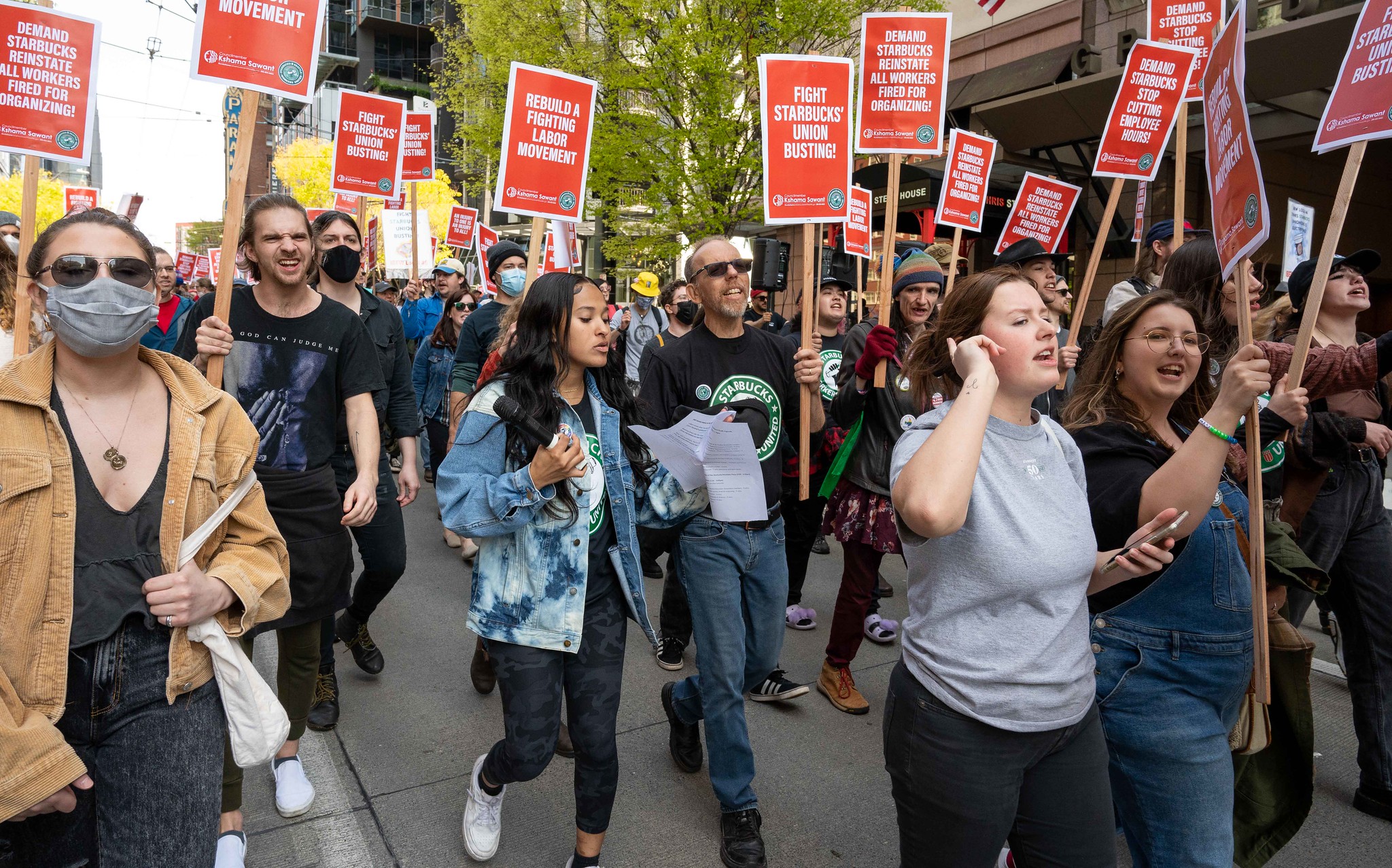Why can’t high-end restaurant workers unionise?
In the high-pressure world of fine dining, organising for better conditions makes sense.
“Kitchens can’t be unionised. It just isn’t possible.” James*, who wanted to keep his identity private, is head chef and owner of a fine dining modern British restaurant in Yorkshire. He thinks the idea of kitchen staff organising for better conditions will never be more than a pipe dream.
“This is an industry that relies entirely on customer satisfaction. That can mean there has to be a sacrifice somewhere on the team. You can’t just down-tools and drop your tea towel the moment your shift finishes if there’s no one to cover. This isn’t like an office job, you can’t clock out because your hours are technically done. It doesn’t work like that.”
As a boss and business-owner, his anxieties about the future survival of his business are clear. It is the idea of strikes and mass walkouts that seems to trouble him most when considering how unions would impact the industry - likely a result of witnessing widespread industrial action across multiple sectors over the last year.
“It’s not even worth thinking about what the benefits of a unionised workforce could be, because it’s just unattainable,“ he argues. “It isn’t feasible for a small business like mine to have to, for example, pay for someone to be off sick for a year, or to find skilled staff to cover if everybody decides to walk out. We wouldn’t survive. The industry wouldn’t survive.”
His fears are common within an industry notorious for its precariousness. Most independent restaurants don’t make it - 60% don’t survive past the first year, and 80% go under in five years - which is 10% above the normal business failure rate. This instability has only got worse in the last few years. In 2022, 1,406 restaurants fell into insolvency amid worker shortages, the lasting impact of the pandemic, and now the cost of living crisis.
But, while it's understandable that owners and employers are grappling with myriad anxieties right now, none of these industry-wide problems are the fault of the worker. And yet it is employees - kitchen and wait staff typically, in lower positions and on lower wages - who are first in line to be punished for the impact of forces outside their control.
James knows this. He says that in an ideal world “it would be a dream to be unionised”, but he simply can’t see how it could work without further damaging an industry that is already flailing.
There are, however, models for organising in the hospitality industry, both at home and across the pond.
In February, kitchen and wait staff at Lodi - an Italian-style cafe in New York’s Rockefeller Center - began wearing gold pins on their uniform to show support for the restaurant’s first-ever union. If they succeed, they could be the forerunners of a new organising movement at high-end culinary spots. However there has been swift and aggressive pushback from bosses. The fledgling union has already filed for unfair labour practice charges, alleging Mattos Hospitality - the restaurant group that runs Lodi - had held a number of captive-audience meetings, with the aim of discouraging unionisation. Mattos Hospitality denied these allegations, publishing a statement saying they are “committed to preserving their [the workers’] right to make an informed decision.”
Regardless of the backlash, the push by workers at Lodi is bold. While we have seen a swell of unionising among workers at chain restaurants and coffee shops in recent years, it is still far rarer in upmarket establishments.
This is in part due to smaller teams at independent restaurants and a lack of cohesive connection between workers at different establishments - making it tough to organise. It’s also likely a result of the historic disposability of kitchen staff, where high turnover used to mean it was too risky to raise complaints. However this is no longer the case due to labour shortages. Changing too, is the historic culture of toxicity, bravado and abuse that were a mainstay of elite kitchen environments.
"There's a weird masochistic streak in chefs"
Frequently depicted in popular culture - think Gordon Ramsay’s Kitchen Nightmares, critically acclaimed HBO series The Bear, and recent blockbuster The Menu - there has been a fascination with and glamorisation of these hostile working environments, with some staff internalising the message that taking abuse is part of the job, or even makes you better. James remembers this well: “I’ve worked in some really aggressive kitchens,” he tells us.
“There was a lot of physical stuff. It was horrible back in the day. But it felt like you were learning from it, which sounds crazy. It was kind of a macho thing. You had to ‘earn your stripes’ to get respect. Looking back now, it was horrible. I went through some shit. I worked with some horrible human beings”
Robert Parks, head chef at double AA rosette restaurant Copper and Ink in London, and former Masterchef contestant, has similar memories of the early days of his career. He got his first professional job in a kitchen in 2015 after appearing on Masterchef, and he started out on the bottom rung of the ladder, working his way through ranks.
“It was pretty brutal to be honest,” Robert tells The Lead. “But there's a weird masochistic streak in chefs where you kind of enjoy how difficult and taxing it can be.” He says it wasn’t uncommon to work 80- or even 90-hour weeks, and people would use their longest streak of uninterrupted shifts as a badge of honour. “My longest was 10 consecutive shifts, starting at 7am and finishing past midnight,” says Robert. “You don't really realise how much your body and mind is suffering until you stop. If you just keep going, you don't give yourself an opportunity to really feel it.”
“The industry lacks good representation in government”
Now, things are different for Robert. He says the culture at Copper and Ink couldn’t be further removed from the toxicity he experienced earlier in his career. He says younger chefs like him want to break the cycle and provide an environment that encourages retention and enables longevity, rather than pushing people to breaking point.
As a paid-up member of the Labour Party, Robert says unionising is something he has always believed in. And, unlike James, he has a very clear vision of how it could work effectively within the restaurant industry. “Workers should have the right to withhold their labour,” he explains. “But I think there are also potential benefits for both employees and restaurant owners in the idea of staff unionising. One issue is how the hospitality industry is regarded within government. I feel that what the industry lacks is good representation in government. Unions are a fantastic way of achieving that. It can become a much more direct conversation - as we have seen with other sectors going through industrial action at the moment.”
That conversation is starting to happen here in the UK. Unite the Union is working to challenge poor employment practises across the sector, fighting for fair tips, decent wages and guaranteed minimum working hours. They have already backed a number of wins for workers in the sector, including a year-long campaign from Pizza Express staff to ensure they didn’t lose their right to 70% of tips made on credit cards, and a campaign to push for employers to provide safe transport home for staff after late shifts.
‘If bosses are not exploiting people, then they shouldn't worry about unionising’
As for the unique challenges of the restaurant industry, Robert doesn’t believe there is any issue that would make unionising impossible: “In terms of working hours, there are certain idiosyncrasies in the industry that are as they are. That would have to be reflected if people were unionised, but this isn’t unsurmountable,” he says.
“The bigger issue that needs to be tackled is where staff are being exploited - whether that’s in terms of hours, pay, or how they’re being treated at work. If bosses are not exploiting people, then they shouldn't have anything to worry about in terms of unionising. I think the argument that a union could be a slippery slope is an argument that's usually made by people who don't want change, full stop.”
For Robert, the precarity of the industry provides an opportunity for a change in culture and a shift in the balance of power. With workers no longer as disposable as they once were, he believes that in order for the industry to survive, owners and employers need to properly incentivise workers. No matter how difficult it may feel to change entrenched cultures, Robert says change is crucial for the future of restaurants.
“It is certainly a difficult time to be having these conversations for employers, because of how fine and how tight the margins are in the industry at the moment,” says Robert. “None of that is the fault of the employees. All of this is part of the broader conversation of what we can do, as a society, from a government level right down to an individual customer level, to make sure we can maintain the hospitality industry that we all enjoy.”
The Lead is now on Substack.
Become a Member, and get our most groundbreaking content first. Become a Founder, and join the newsroom’s internal conversation - meet the writers, the editors and more.




